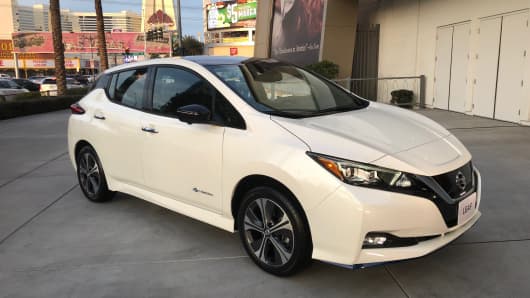
Paul Eisenstein/CNBC
The Nissan IMs electric sports sedan at the 2019 North American International Auto Show in Detroit on Monday, Jan. 14, 2019.
While most of the products debuting at this year's North American International Auto Show give a glimpse of what will be coming to showrooms before the end of the year, Japanese automaker Nissan and its luxury Infiniti brand, are looking a bit further into the future with a pair of radical battery-electric vehicle concepts.
The Nissan IMs and Infiniti QX Inspiration, unveiled in Detroit this week, don't just hint at the broad plans the two marques have to electrify their lineups. The models imagine what Nissan's North American CEO described as a "complete reinterpretation" of how tomorrow's zero-emissions vehicles will be designed and engineered. Among other things, that will allow them to create vastly more roomy interiors by all but eliminating the traditional engine compartment.
"Our strategy with electric vehicles isn't if it will happen, but when it will happen," Nissan North America CEO Denis Le Vot said as he lifted the covers on the IMs concept vehicle during a news conference at the show.
Nissan was the first major automaker to launch a high-volume battery-electric vehicle and, since the Leaf hatchback came to market in 2011, it has become the world's best-selling BEV. It has been losing momentum, however, as competitors like the Tesla Model 3 and Chevrolet Bolt EV have come to market. To kick-start sales, the automaker last week announced it will increase the range of the Leaf by about 50 percent, to 226 miles.

Photo: Paul Eisenstein
2019 Nissan Leaf
But the Leaf also will be getting company in the coming years. Le Vot also announced in Detroit that Nissan will have eight all-electric models in its global fleet by 2022. Alliance partners Renault and Mitsubishi are bringing out four more. The Japanese maker alone is forecasting it will see about 1 million BEVs annually by mid-decade.
While the Nissan brand will continue to market conventionally powered gas and diesel models for the foreseeable future, the Infiniti division is planning an even more aggressive transformation, said Christian Meunier, the recently named CEO of the Infiniti brand, which is based in Hong Kong.
Starting in 2021, all products will be electrified, he said in an interview. In the case of Infiniti, that will mean both battery-electric vehicles and what are known as serial plug-in hybrids. These have range-extending gas engines on board, but if they fire up they only serve as generators, sending power to the electric motors that actually drive the wheels.
"It will take about two to three years" to phase out conventional drivetrains, Meunier estimated.
Infiniti suffered an embarrassing moment at the auto show on Monday, when its QX Inspiration concept initially failed to roll out onto the stage, as planned, due to a problem with its electric drivetrain. Despite that setback, Meunier called the prototype "the embodiment of our future in the form a striking electric crossover."
The QX Inspiration is loaded with upscale features, including a marble center console and a Japanese redwood roof liner. But like the less exotically finished Nissan IMs, what really matters is the actual layout of the vehicle.

Paul Eisenstein/CNBC
The Infiniti QX Inspiration at the 2019 North American International Auto Show in Detroit on Monday, Jan. 14, 2019.
Indeed, both concepts place their battery packs, motors and other key drivetrain components under their load floors. That means there is virtually nothing left that would require a conventional engine compartment. So, both IMs and QX Inspiration adopt a very "cab-forward" design, as global Nissan corporate design director Alfonso Albaisa calls it. That recaptures much of the area that normally would be under the hood, yielding the equivalent of a full-size interior in a compact car's footprint.
"We think this is a unique opportunity to improve the ergonomics of our vehicles," said Karim Habib, Infiniti's design chief.
Meunier noted that Infiniti and Nissan will consolidate the prototype platforms used for the IMs and QX Inspiration concepts by the time production versions come to market, reducing development costs and increasing efficiencies.
Both concepts also feature fully autonomous driving capabilities, though motorists can drive manually if they prefer. In fully driverless mode, however, Habib and Albaisa noted vehicles could be transformed into mobile living rooms or offices, with steering wheels retracting and seats being allowed to swivel so occupants can face one another.
How soon fully autonomous technology will be ready for production is a matter of debate, but the push to electrification — and with it a major shift in auto design — is already underway. Jaguar adopted a more cab-forward approach with the new I-Pace battery SUV it launched for the 2019 model year, and other brands are expected to follow.

Paul Eisenstein/CNBC
The Nissan IMs electric sports sedan at the 2019 North American International Auto Show in Detroit on Monday, Jan. 14, 2019.Original Article